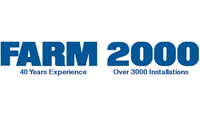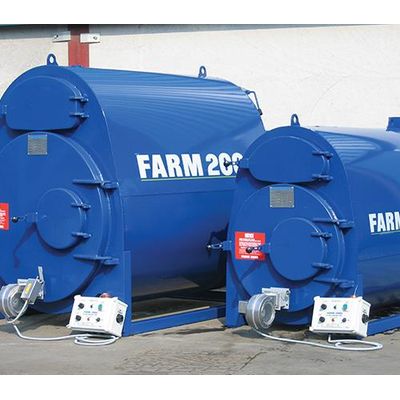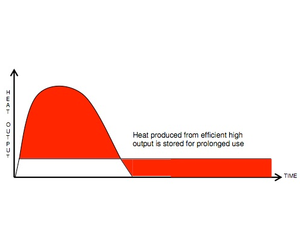

- Home
- Companies
- FARM2000 - M & K Products (Bromsgrove) ...
- Products
- FARM2000 - High Temperature (HT) ...

FARM2000 - High Temperature (HT) Biomass Boilers
FARM2000 High Temperature (HT) boilers are used for heating, hot water and hot air systems by efficient and controlled combustion of biomass. Biomass contain gases which represent half of the calorific value, and which can only be burned and release their energy at high temperatures.
The HT boilers therefore have secondary air pre-heating and 2-stage fan operation to ensure that upward gasification and clean combustion at high temperature is achieved. Low temperature combustion produces smoke, tar and increased fuel use.
The high temperature waste gases pass through a multi-tube heat exchange system, transferring heat to the water before exhausting to the chimney.
The entire combustion process is thermostatically and timer controlled. ‘HT’ Boilers are unique in their simple operation and large loading capacities. Depending on boiler size,
refuelling is generally only required 1-2 times per day.

HT60, HT70 & HT80 BOILERS ARE APPROVED FOR USE IN “SMOKELESS ZONES” WHEN BURNING CEREAL STRAW
- Large Combustion Chamber.
- Low stoking frequency.
- Fan operation.
- Rapid heat output from cold start, accurate control.
- Safety and economy.
- Pre-heated secondary air providing upwards gasification with 2-stage clean and complete combustion, low ash level, minimal or no smoke.
- Multi-tube heat exchanger.
- Maximum heat output to water.
- Large stoking door & secondary door.
- Easy loading with additional smaller secondary door on all boilers for safety, convenient lighting, ‘topping up’, and inspection.
- Vertical or Horizontal Flue Outlet.
- Lower chimney costs, easy access cleaning.
- Large insulated water jacket with special water circulation design.
The first thing is to establish the maximum heat demand. This should be done by your heating engineer, but also take reference from your current boiler, or approximate from the volume and insulation standard of the building as follows:

Example 1 : A pre-1960s farmhouse (3 – 5 bedroom)
Cu. ft. 60 x 33 x 17 = 34,000 cu. ft. x 4.5 = 153,000 Btu/hr
Cu. metres 18 x 10 x 5 = 900 cu. m. x 0.046 = 41.4 kW
(Plus hot water 7000Btu/hr or 2kW) = Approx. 160,000 Btu/hr or 43.4 kW
Example 2 : A modern farmhouse (3 – 5 bedroom)
Cu. ft. 60 x 33 x 17 = 34,000 cu. ft. x 2.5 = 85,000 Btu/hr
Cu. metres 18 x 10 x 5 = 900 cu. m. x 0.026 = 23.4 kW
(Plus hot water 7000Btu/hr or 2kW) = Approx. 92,000 Btu/hr or 25.4kW
Please Note: FARM2000 can provide general guidance on boiler sizing, but the ultimate responsibility for heat loss calculation remains with the customer.
Choosing your boiler
Once you have established the maximum heat demand, the boiler can be selected from the FARM 2000 Boiler Selection guide according to the main fuel and required stoking frequency.
The less often you want to stoke the boiler, the larger it has to be. Therefore, when using bulkier fuels (straw vs wood), a larger boiler should be selected.
Many FARM2000 customers use a combination of both fuels, using wood in the coldest periods and straw for less severe conditions. e.g. HT45 on wood can maintain the same heat output as HT60 on straw.
How much wood or straw will be required?
As a rough guide, when burned in a FARM2000 batch boiler, 1kg of dry straw (max. 16% water content) or wood (max. 20%) will provide approximately 2.6 – 3.0 kWh or 9,000 – 10,000 Btu’s.
Bear in mind that maximum heat demand is normally calculated at -1 deg.C. The average 6 month heating season consumption, based on a thermostatically controlled system, is usually 30-40% of this. See boiler size guide.
In order to keep stoking frequency to a minimum, it is usual to install a boiler with a higher maximum output than the maximum heat demand of the building. The boiler operates for just a few hours per day with the heat being stored in a large accumulator (heat store) for controlled and continuous output.
The graph below shows how supply of heat is smoothed over time by using an accumulator.

Without Accumulator
Smaller boilers which are loaded 2-3 times per day and can feed upstairs hot water and gravity radiator circuit can be installed without an accumulator.
With Accumulator
For larger boilers where low stoking frequency is required (1-2 times per day or less), large accumulators are strongly recommended. Not only to store heat but to absorb excess heat in the event of pump or power failure. More about accumulators
With Back-Up Boilers
Existing oil/gas fired boilers can be retained as back-up to an automatic or manually stoked boiler.
Installation Guidance
FARM2000 do not physically fit boilers, but with over 30 years experience, we can offer guidance to both to you and your installer.
Most FARM2000 boilers are installed by heating engineers/plumbers with no previous experience of our boilers.

